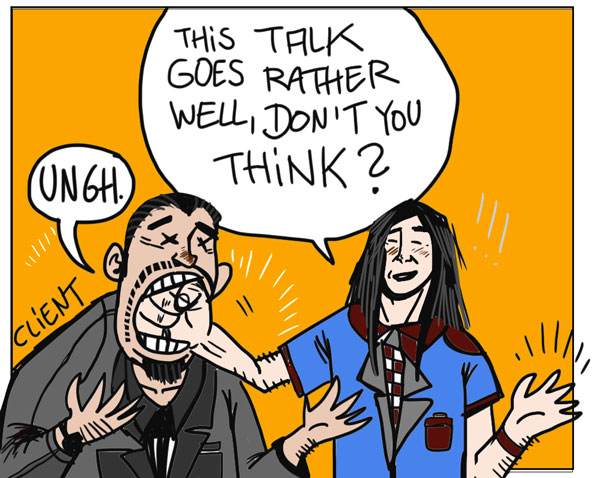By Mars Dorian, {grow} Contributing Columnist
Today I am going to help you learn from my mistakes by teaching you a valuable lesson in Internetiquette. No need to thank me.
Internetiquette is like real English, except it’s adjusted for the web. In offline life, you have facial expressions, hand motions and voice intonation to convey style, but online, you lack these. When you communicate online mostly through written messages like me, and you gather new clients by cold-blooded email, you have to re-think the psychology.
The following three tips are based on my crash and burn failures of the past.
1) Sugarcoat your sentences.
When I started my web career, a British friend of mine warned me about working with Americans. He said I’d have to sugarcoat my words or else I’d end up offending them. I thought he was kidding, that it was some kind Brit / American nit-picking taking place.
But later that year, I had a lot of communication crashes because I failed to listen to that lesson. I asked my potential American clients “normal” questions, and either got a negative in return, or none at all. Sentences like:
- “What do you want?”
- “Why do you want to work with me?” or
- “What’s the matter with your biz?”
These rubbed a lot of Americans the wrong way. In my mind, hearing my own voice, it was perfectly reasonable. But the letters on the screen didn’t carry my relaxed intonation, so the potential client from across the pond thought I was one brash, peeved off something.
Now, putting a smiley face next to your sentence is cute for your friends, but when you’re taking part in biz conversations, and you start poppin’ out those emoticons, the other side will think you’re either a degenerate, or a 14-year-old “Belieber” who’s learned language through viral cat videos.
So instead, I take out my finest textbook English:
- What can I help you with?
- Could you clarify that for me please?
- If you could please do (X), that would be very helpful.
I know, it sounds a bit stilted, as if the queen herself is sipping some breakfast tea while typing away the words with her cashmere glove. But it works, and it results in a harmonic convo that breeds win-win results.
My online conversation style is at least twice as sugarcoated as in real life. And so far, not a single soul has lamented that I’m too nice.
2) Ask, Ask Ask.
Because of the lack of intonation and other subtle gestures, it’s hard to convey style through a written sentence on the screen.
“I hate you” sounds harsh and drastic, but if I say it in real life and chuckle, it means something different. On the web, a seemingly harmless sentence can turn out to be ambiguous.
I can’t even count the number of times I’ve worked on an illustration project for weeks, only to realize the client’s so-called project description turned out to be an ironic joke!
I had one client who said he wanted to see the typical “Mars Dorian” on every image. I thought he meant he wanted to see my edgy, Mars Dorian style on the artwork. So I cranked out a dozens of my finest Mars Dorians and showed them to him two weeks later. He wrote back and said they were too “out there” and “edgy” and I thought that’s exactly what he wanted when he asked to see the typical “Mars Dorian.”
In fact he meant he wanted to see my typical Mars Dorian signature on every picture, as proof to link names and artwork together on the accompanying invoice.
Insert facepalm here.
Granted, the client was not a native English speaker (and neither am I), but I was still too afraid to ask for clarification, and I paid for it by working for weeks for free. Ungh.
It doesn’t matter if attention spans are short online, save yourself the future pain. Always ask away. Something is not clear? Ask. Is the statement real or ironic? Ask. It’s better for both sides.
3) Categorize the wants.
Vera F. Birkenbihl, a famous business coach in Germany who unfortunately died recently, came up with a great way to deal with offline / online deals. If you want a conversation to be crystal clear, she said you should always categorize the wants. Meaning, you put every online statement in either of the following categories :
- “What’s in it for them.
- “What’s in it for you.”
Now with these two categories in mind, you “scan” your online conversations and put the other side’s message in either one of these categories. And if too many sentences end up in the “what’s in it for them” category, you know…
A) it’s a win-lose deal– win for them, lose for you.
B) You should clarify with more questions to find out what’s in it for you.
Whenever I get a new email offering some kind of joint venture or deal, I use this category approach. Funny side note: all spam messages end up in the “What’s in it for them’ category, almost 100% exclusively.
Well I hope you have learned from my mistakes today. What kind of of internetiquette do you use?

Original illustration by the author.



